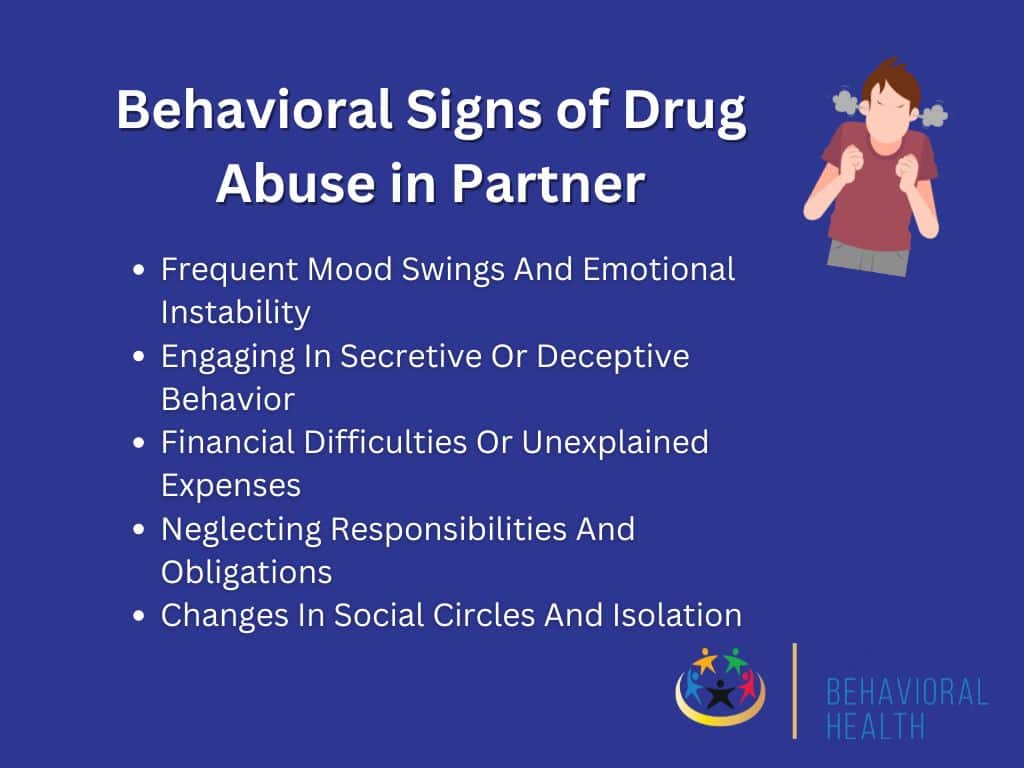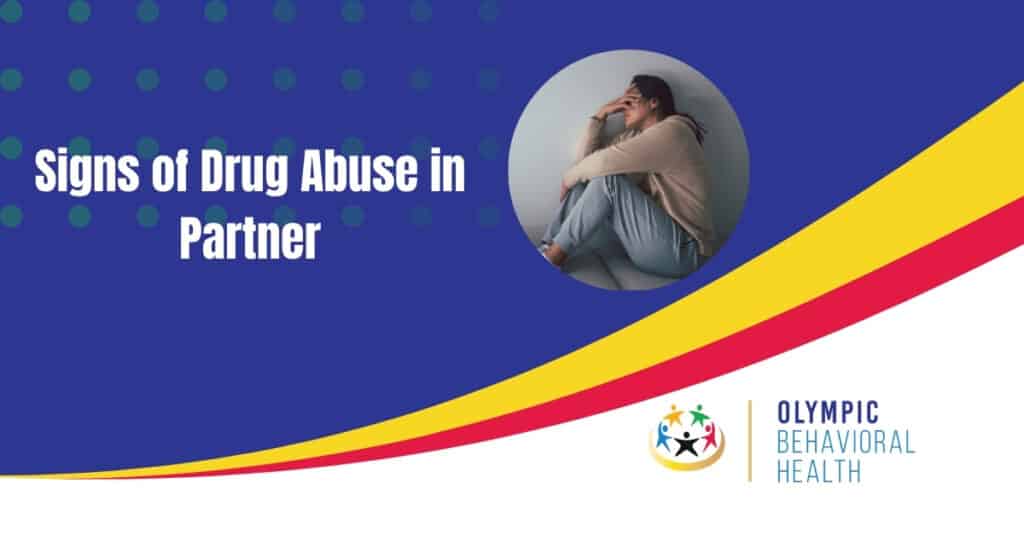Drug abuse refers to the detrimental and uncontrollable use of substances, leading to adverse physical, emotional, and social consequences. It involves the persistent consumption of drugs despite negative outcomes, posing significant challenges to both the individual and their partners.
Physical signs of drug abuse in a partner often manifest in observable changes in appearance and behavior. These include bloodshot eyes, dilated pupils, unexplained weight fluctuations, and noticeable injection marks. Additionally, irregular sleeping patterns and a decline in personal hygiene indicate substance misuse.
Environmental signs of drug abuse in a partner encompass the presence of drug paraphernalia, unusual odors, or secretive behavior related to substance use. Finding drugs or drug-related items, such as needles, pipes, or pill bottles, can be indicative of ongoing substance abuse within the shared environment.
Changes in mood, personality, and daily habits characterize behavioral signs of drug abuse in a partner. These include sudden mood swings, increased secrecy or dishonesty, financial instability, and decreased reliability or responsibility. Additionally, individuals often exhibit risky behaviors or engage in illegal activities to obtain drugs.
Social signs of drug abuse in a partner involve alterations in social interactions, relationships, and daily activities. Partners often withdraw from social engagements, neglect familial responsibilities, or exhibit strained communication patterns. Changes in social circles, frequent conflicts, or legal issues also indicate underlying substance abuse problems.
Physical Signs of Drug Abuse in Partner
Changes In Appetite And Weight Loss/Gain
Drug abuse significantly impacts appetite, leading to noticeable changes in the weight of the partner as studied by Mahboub, N. et al. 2021, “Nutritional status and eating habits of people who use drugs and/or are undergoing treatment for recovery: a narrative review.” Individuals often experience sudden weight loss or gain unrelated to dietary factors. Substances suppress appetite or induce binge eating, resulting in irregular eating patterns and fluctuations in body weight that the partner easily notices.
Bloodshot Eyes And Dilated Or Constricted Pupils
The eyes reveal telltale signs of drug use. Bloodshot or glassy eyes, along with unusually dilated pupils, indicate the influence of drugs on the central nervous system and blood vessels. These physical changes are often difficult to conceal from someone living in the same space.
Needle Marks Or Wounds, Especially On Arms
Intravenous drug use often leaves behind visible marks or wounds, particularly on the arms. These marks appear as puncture wounds, bruises, or track marks, indicating the injection of substances directly into the bloodstream. The presence of such marks, especially if efforts are made to conceal them, is a clear indicator of drug abuse in the partner.
Decline In Personal Hygiene And Grooming Habits
Individuals struggling with drug abuse often neglect basic self-care practices, leading to a decline in personal hygiene and grooming. This neglect manifests as unwashed hair, body odor, unkempt appearance, and a disregard for dental hygiene.
Signs Of Withdrawal Or Overdose, Such As Tremors Or Unconsciousness
Withdrawal symptoms or overdose indicators, such as tremors, seizures, confusion, or loss of consciousness, suggest a severe dependence on drugs and potential medical emergencies. These acute manifestations of drug abuse require immediate attention and intervention to prevent further harm or complications.
Environmental Signs of Drug Abuse in Partner
Presence Of Drug Paraphernalia
Discovering items such as syringes, pipes, rolling papers, or pill bottles in the partner’s belongings or living space indicates active drug use. Drug paraphernalia serves as tangible evidence of substance abuse and suggests ongoing consumption or experimentation with illicit substances.
Unusual Odors In Living Spaces
Certain drugs emit distinct and pungent odors that linger in the environment, even after use. The presence of unusual smells like burnt plastic, chemicals, or strong herbal scents indicates drug-related activities occurring within the home or personal space, serving as a red flag for substance abuse.
Excessive Use Of Deodorizers Or Air Fresheners
Attempts to mask or cover up the smell of drugs through the frequent use of deodorizers, air fresheners, or incense suggest conscious efforts to conceal substance abuse from others, especially partners. A sudden increase in the use of such products is a signal underlying drug-related activities requiring further investigation.

Behavioral Signs of Drug Abuse in Partner
Frequent Mood Swings And Emotional Instability
Individuals struggling with drug abuse often experience rapid and unpredictable changes in mood, ranging from euphoria and joy to irritability, agitation, or depression and violent behavior, as discussed by Stellern, J. et al. 2023, “Emotion regulation in substance use disorders: a systematic review and meta-analysis.” These fluctuations occur without apparent triggers and disrupt interpersonal relationships, indicating the emotional turmoil associated with substance dependency.
Engaging In Secretive Or Deceptive Behavior
Concealing activities, lying about whereabouts, or exhibiting secretive behavior are common traits of individuals involved in substance abuse. Partners often notice inconsistencies in explanations, unexplained absences, or reluctance to disclose information, signaling attempts to hide the extent of drug-related behaviors and activities.
Financial Difficulties Or Unexplained Expenses
The financial toll of drug addiction manifests as sudden financial instability, borrowing money without explanation, or unexplained expenses that deplete shared resources. Partners often observe discrepancies in spending habits, unpaid bills, or unaccounted-for withdrawals, highlighting the financial consequences of substance abuse.
Neglecting Responsibilities And Obligations
Prioritizing drug use over essential responsibilities and obligations, such as work, childcare, or household chores, reflects the impact of substance abuse on daily functioning. Partners often observe a decline in productivity, missed deadlines, or neglect of critical tasks, indicating the disruptive effects of addiction on daily life.
Changes In Social Circles And Isolation
Individuals struggling with drug abuse often withdraw from previously enjoyed social activities and relationships, opting to spend time with peers involved in substance use or isolating themselves to conceal their habits. According to Roe L. et al. 2020, “Isolation, Solitude and Social Distancing for People Who Use Drugs: An Ethnographic Perspective.” Partners notice a reluctance to participate in social gatherings, reduced communication with friends and family, or a shift in social priorities, highlighting the social consequences of addiction.
Social Signs of Drug Abuse in Partner
Strained Interpersonal Relationships
Drug abuse often strains relationships with family members, friends, and romantic partners due to deceit, conflict, or unreliable behavior. Partners notice increased tension, arguments, distance in the relationship, and even physical and verbal violence, reflecting the interpersonal challenges associated with substance abuse.
Legal Issues Or Encounters With Law Enforcement
Involvement in legal problems, such as arrests, citations, or legal charges related to drug possession or distribution, suggests significant legal ramifications of substance abuse. Partners become aware of legal issues through official notifications, encounters with law enforcement, or discussions about legal proceedings, highlighting the legal consequences of addiction.
Decline In Occupational Performance
Substance abuse badly impairs cognitive function, motivation, and concentration, leading to a decline in academic or occupational performance. Partners easily notice reduced productivity, absenteeism, poor grades or job evaluations, or disciplinary actions at work or school, indicating the educational and professional repercussions of addiction.
Financial Instability And Economic Hardships
Drug addiction often leads to financial strain, as individuals prioritize drug acquisition over financial responsibilities. Partners usually notice unpaid bills, mounting debts, financial crises, and even stealing money to meet the expenses of buying drugs, highlighting the economic impact of substance abuse on financial stability and security.
What To Do When You Discover That Your Partner Has An Addiction?
Discovering that your partner has an addiction is distressing and challenging to navigate, but there are steps you can take to address the situation and provide support:
Educate Yourself
Learn about addiction, including its causes, effects, and available treatments. Understanding the nature of addiction will help you approach the situation with empathy and knowledge.
Communicate Openly
Initiate honest and non-judgmental conversations with your partner about their addiction. Express your concerns calmly and encourage them to share their feelings and experiences.
Encourage Professional Help
Encourage your partner to seek professional assistance from a healthcare provider, therapist, or addiction specialist. Offer to accompany them to appointments and provide emotional support throughout the process.
Set Boundaries
Establish clear boundaries regarding behavior related to the addiction. Communicate your expectations and enforce consequences for violating boundaries, but do so with compassion and understanding.
Seek Support for Yourself
Dealing with a partner’s addiction takes a toll on your emotional well-being. Seek support from friends, family members, or support groups to help you cope with your challenges.
Encourage Healthy Habits
Support your partner in adopting healthy lifestyle habits, such as regular exercise, nutritious eating, and stress management techniques. These habits will complement their recovery efforts and improve overall well-being.
Avoid Enabling Behaviors
Refrain from enabling your partner’s addiction by avoiding behaviors that will allow or facilitate their substance use. Instead, focus on supporting their recovery journey and encouraging positive changes.
Stay Patient and Supportive
Recovery from addiction is a journey that takes time, effort, and commitment. Be patient with your partner and offer unwavering support as they navigate recovery challenges.
Addiction is a complex issue, and recovery involves setbacks and challenges along the way. By offering understanding, support, and encouragement, you can play a vital role in helping your partner overcome addiction and rebuild their life.
1. Can drug abuse in a partner lead to legal consequences?
Drug abuse in a partner can result in legal troubles if the individual engages in illegal activities such as the possession or distribution of illicit substances. Driving under the influence or involvement in criminal behavior to support drug habits can also lead to legal repercussions.
2. How can I approach my partner about their suspected drug abuse?
Approaching a partner about drug abuse requires sensitivity and empathy. Choose a private and calm setting to express your concerns without judgment. Offer support and encouragement to seek help, and be prepared for reactions, including denial or defensiveness.
3. What role does enabling play in perpetuating drug abuse in a relationship?
Enabling behavior, such as providing financial support or covering up consequences of drug abuse, inadvertently reinforces addictive patterns and hinders the individual’s motivation to seek treatment. Setting boundaries and seeking support for yourself can help break the cycle of enabling.
4. Is it possible for someone to be a high-functioning drug addict?
It is possible for someone to be a high-functioning drug addict and maintain a good outward appearance despite struggling with drug addiction. High-functioning addicts may hold down jobs, fulfill family obligations, and appear socially adept while concealing their substance abuse behind closed doors.
5. How can I support a partner in recovery from drug addiction?
Supporting a partner in recovery involves educating yourself about addiction, participating in couples therapy or support groups, and encouraging healthy habits and coping mechanisms. Patience, understanding, and a non-judgmental attitude are essential to effective support.

Share This Post



